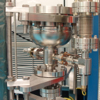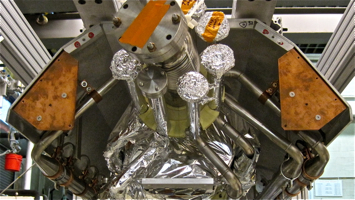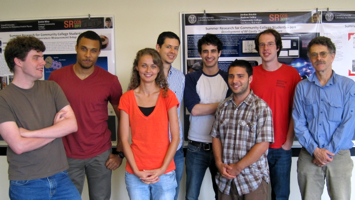"There is nothing like looking, if you want to find something. You certainly usually find something, if you look, but it is not always quite the something you were after."
J.R.R. Tolkien
Matthias Liepe; Associate Professor of Physics, Cornell University
Welcome to the webpage of Matthias Liepe's research group. Our group is part of Cornell's accelerator physics group and Cornell's Superconducting Radio Frequency (SRF) group at the Cornell Laboratory for Accelerator-based Sciences and Education (CLASSE).
Our research focusses on studying the behavior of superconductors in high fields at microwave frequencies and their application in superconducting RF cavities for particle accelerators. On these pages you can find out more about our research, outreach, and teaching.
Graduate and undergraduate students who are interested in performing cutting edge research in accelerator physics are encourage to contact us. Find out more about opportunities for students.
This site is currently under construction...
Research News
03/12/12: Mushroom TE Sample Host Cavity Field Passes 500 Oe Milestone

Our new mushroom TE-mode sample host cavity passed an important milestone last week by reaching magnetic fields of up to 600 Oe on its sample plate.
02/15/2012: Cornell-ERL Main-Linac Cavity Reaches Performance Specs in Cryomodule Test

The first ERL-prototype accelerating cavity achieved an efficiency of Q0=2.3E10 at 16MV/m and 1.8K in a horizontal test.
9/13/2011: Cornell SRF Graduate Student Receives Poster Award

We are proud to announce that Sam Posen was awarded one of the two Best Student Poster Prizes at the International Particle Accelerator Conference 2011.
More News ![]()
Our Research

Superconducting radio frequency (RF) cavities are feet-long structures, providing extremely high electric field gradients (tens of MV/m) for the acceleration of particle beams. The electric field inside these cavities oscillates at resonant microwave frequencies (GHz), with exceptional high quality factors of 1E10 to 1E11. By using superconducting materials operated at temperatures between 1.5K and 4K for the walls of the cavities, we can achieve such high quality factors. The evolution in the performance of superconducting cavities has revolutionized the performance and scientific reach of particle accelerators for a variety of science applications, including high energy physics, nuclear physics, synchrotron radiation based research, and high power lasers. Future particle accelerators like the International Linear Collider, the X-ray Free Electron Laser at DESY, a muon accelerator, and the Energy Recovery Linac Light Source planned here at Cornell University all rely on the performance we hope to achieve in next generations of superconducting cavities.
Teaching

"What you leave behind is not what is engraved in stone monuments, but what is woven into the lives of others."
Learn more about my teaching here.
Outreach

The National Science Foundation (NSF) has awarded me a grant to establish a summer research program for upstate New York community college students. Under this program, four to five students interested in a career in science, engineering, and technology are invited to participate in cutting-edge research at the Cornell Laboratory for Accelerator-based Sciences and Education (CLASSE).
Recent Publications
- More Publications

- Recent Talks

- Our Videos

Contact
Matthias Liepe
328 Newman Lab and 302 Physical Sciences Building
Ithaca, NY 14853
(607) 254-8937
email: MUL2@cornell.edu
More Contact Information ![]()
